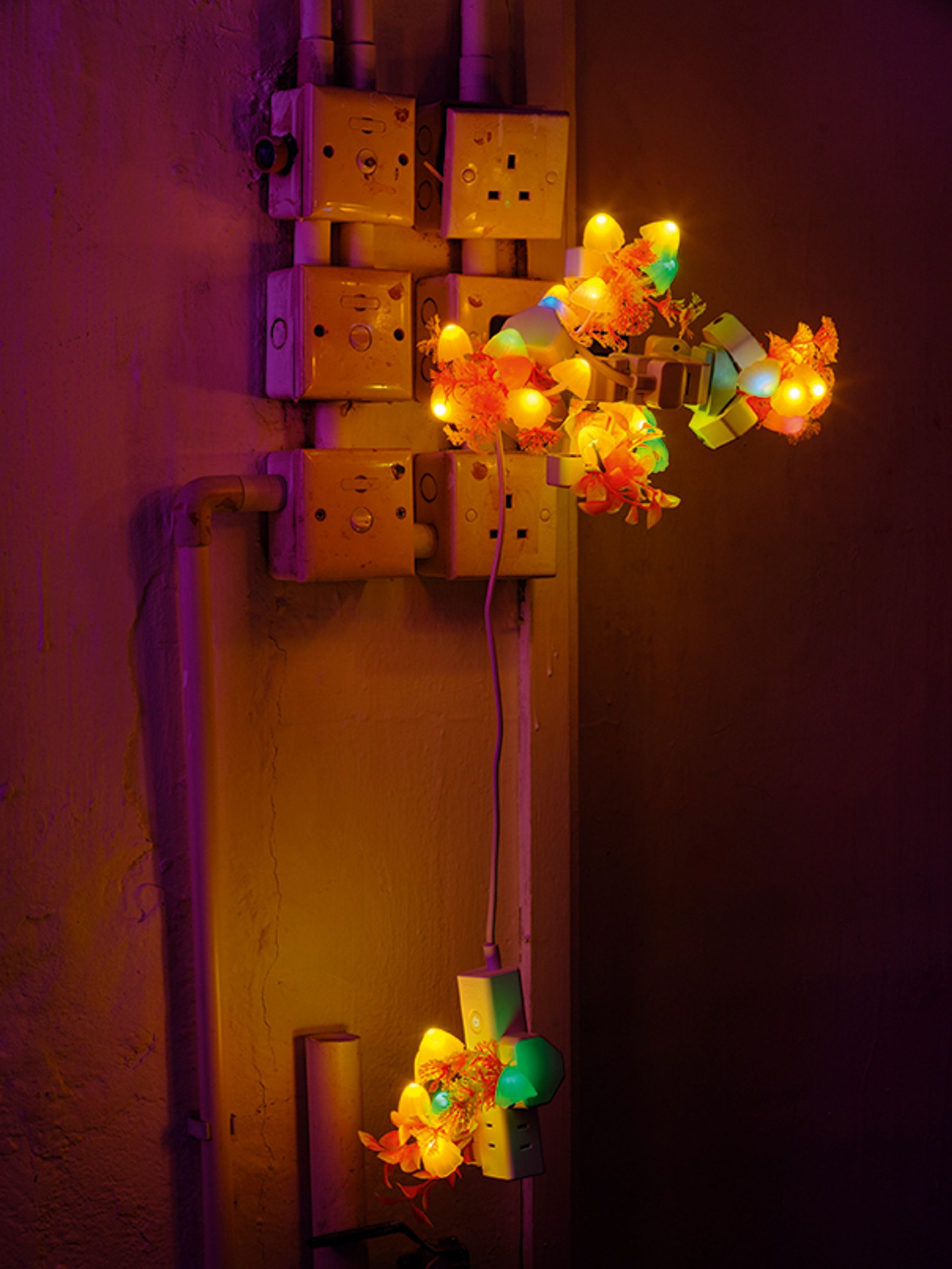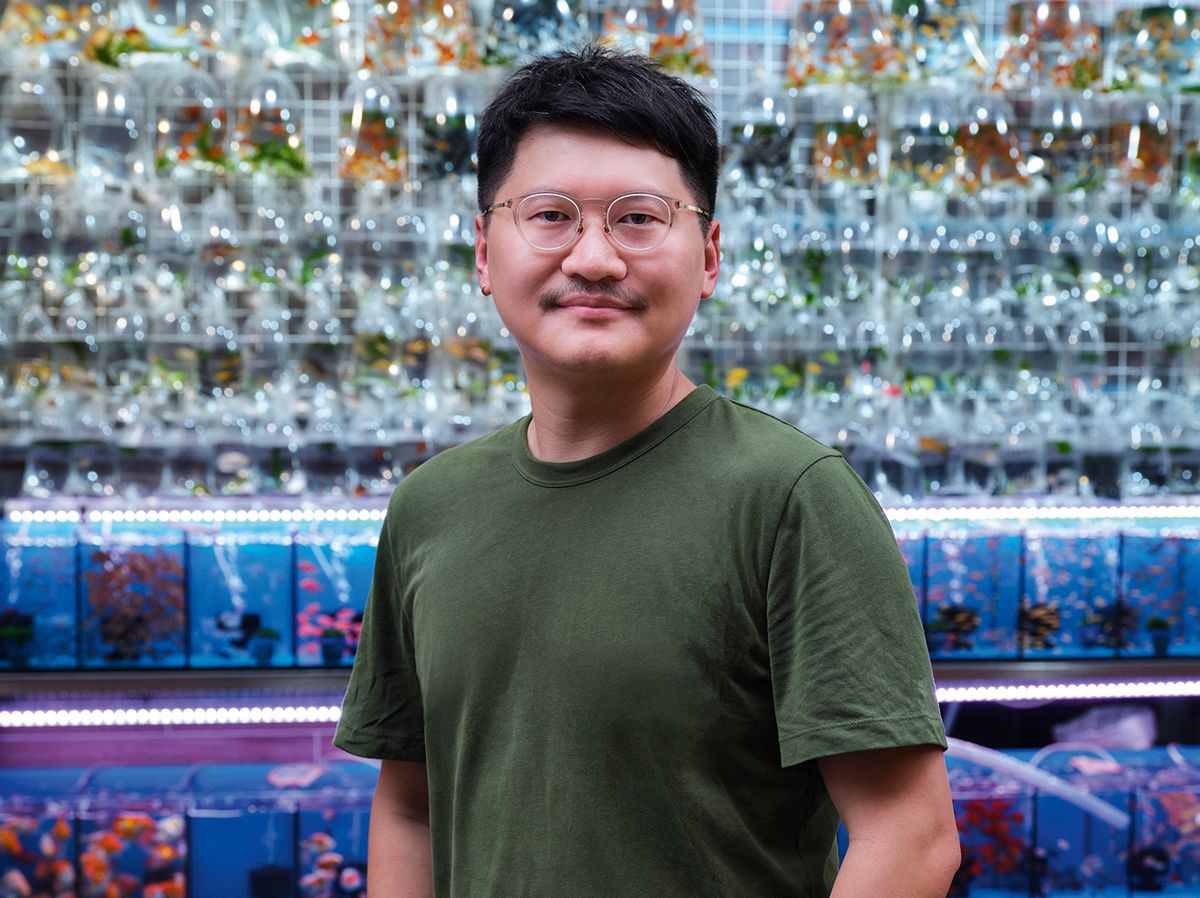One of London’s most notorious plants has been replicated at Para Site contemporary art centre, courtesy of the Hong Kong artist Trevor Yeung. His new solo show, Soft breath, recreates a section of the so-called “fuck tree”, which resides in a secluded part of Hampstead Heath. The oak’s roots grow at an angle that positions its trunk close to the ground, making it possible for one, two, or more, people to bend over it. Human intervention has moulded the tree, too: so regularly do amorous Heath-goers rub against it that sections of the bark have been buffed smooth.
“This tree is a physical embodiment of desire, that most enigmatic of feelings. It’s a monument to human interactions,” Yeung says. He compares the tree’s surface to the stone steps of ancient temples, eroded and polished over centuries by worshippers’ feet. Indeed, the tree has acquired a totemic status among London’s queer community as a gay cruising destination.
Yeung’s installation attempts not only to recreate the tree, but the bodily experience of its environment. The soap used to mould the tree has an “earthy” scent: a combination of musk, soil and wood. “Smell is highly important when cruising at night,” the artist says. “You can’t see, so your other senses are heightened.”

Trevor Yeung’s Night Mushroom Colon (2024), showing at the Venice Biennale until 24 November © Trevor Yeung Photo © South Ho Commissioned by M+, 2024
He relates Soft breath to his wider interest in decoding systems. “I am fascinated by the unspoken rules of gay cruising culture: what you can and can’t say, or do; how people move around the space.” Yeung does not shy away from the carnal associations of the tree, yet his show is about more than cruising. Or rather, it is a show about cruising in its totality—from its motivations to its execution and aftermath—which considers the charged network of social and sexual relations in which these acts take place.
The Para Site exhibition reconfigures Yeung’s project Soft ground, presented last year at London’s Gasworks space, for Hong Kong audiences. Here he has incorporated references to the Lam Tsuen Wishing Trees, a shrine in the city’s New Territories where people throw oranges tied to their wishes, written on red incense papers, and try to land them on the branches. “They are both trees that are affected physically by the desire of the users,” Yeung says.
Onward to Venice
Themes of social codes and relationships recur in a different guise in Yeung’s forthcoming exhibition representing Hong Kong at the Venice Biennale, which opens on 20 April. Commissioned by M+ museum and the Hong Kong Arts Development Council, it will travel in an adapted form to M+ in 2025. Courtyard of Attachments takes inspiration from Venice and Hong Kong’s shared proximity to the ocean. But while encounters with water are unavoidable in Venice—with its 150-odd canals and the risk of rising sea levels—Hong Kong’s urban planning has, for decades, shifted its centre inland. Perhaps this is what compels so many Hong Kongers to capture the ocean in miniature form by owning pet fish: the Special Administrative Region is a leading centre for the trade of ornamental aquatic life.
“Aquariums are everywhere in Hong Kong, many of them very elaborate,” Yeung says. “Yet there are barely any fish tanks in Venice. Except in Chinese restaurants.” At the Biennale, Yeung’s show will have around ten aquariums and water features. Some will be site-specific, including a fountain in the outdoor courtyard filled with water from the Venice lagoon. Many of the tanks will be fully operational with filters and pumps, while a few will have special features. These include a water vortex that resembles a small tornado and a blacklight that helps fish owners monitor bacteria.
Crucially, however, there will be no fish in these waters. “If the exhibition had fish, that’s all visitors would focus on,” Yeung says. The tanks are a vehicle to prompt a conversation around the issues he has explored throughout his career: control, the systems we live in and the ambiguity of human relationships. “I want to consider the lines between control and
care that exist in our relationships with pets and, by extension, with each other,” he says. “These seemingly conflicting dynamics draw from similar impulses. In relationships, we can often confuse one for the other.”
• Trevor Yeung: Soft breath, until 26 May, Para Site, 22/F, Wing Wah Industrial Building, 677 King’s Road, Hong Kong
• Trevor Yeung: Courtyard of Attachments, Hong Kong in Venice, 20 April-24 November, Campo della Tana, Castello 2126, 30122, Venice


